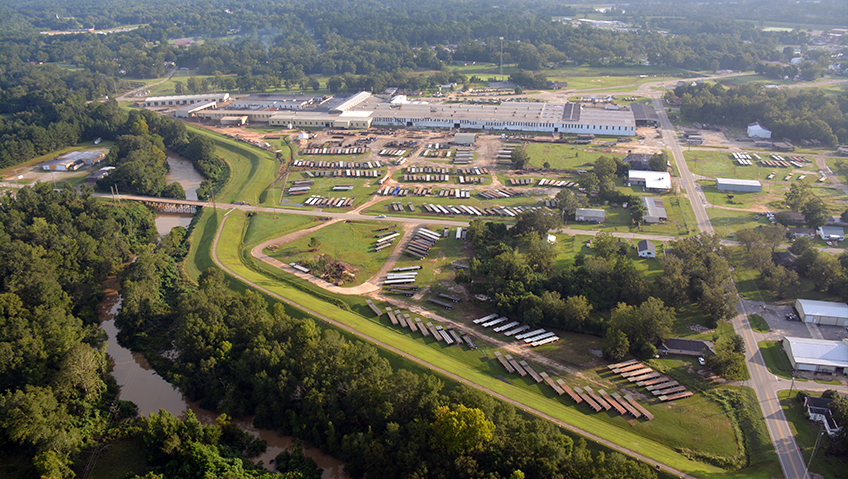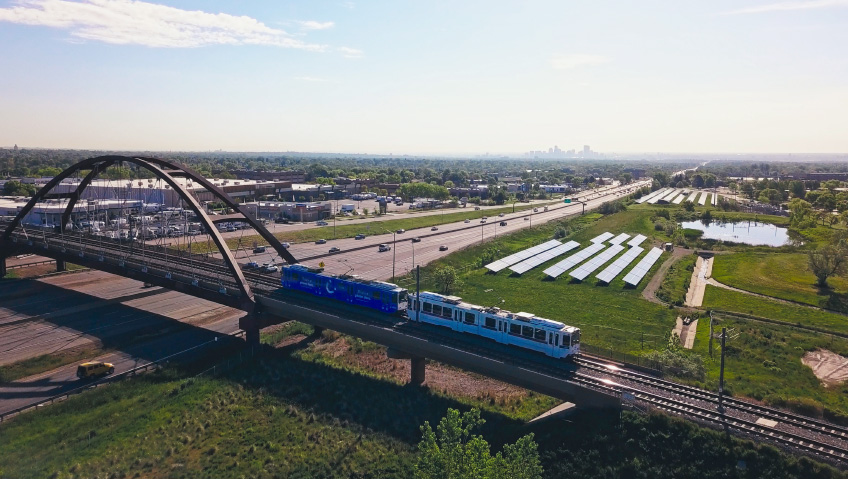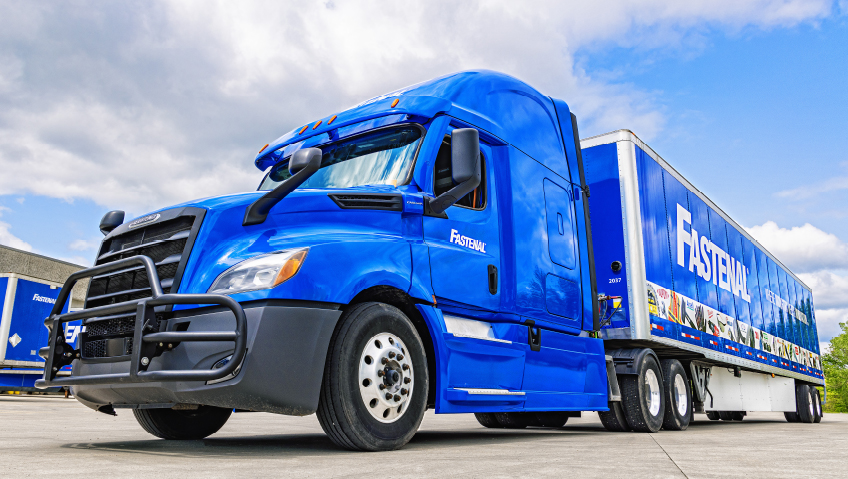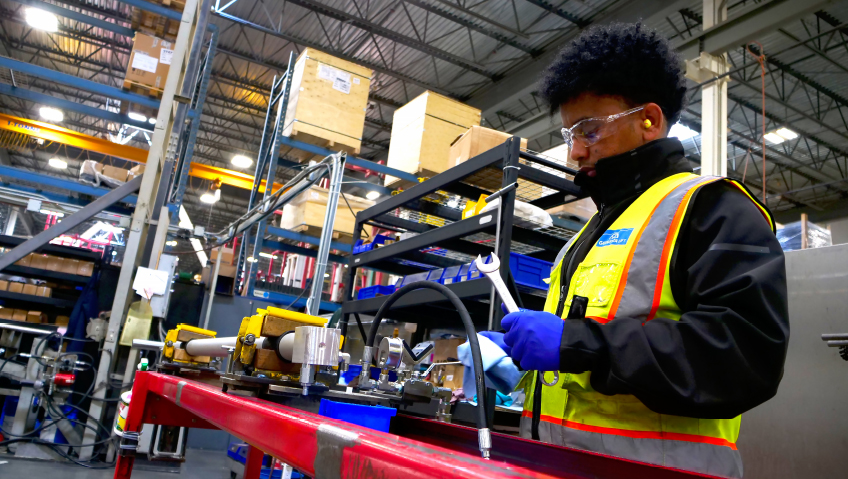For over a century, Elba, Alabama-based Dorsey Trailer has designed, manufactured and fabricated a wide variety of trailers used to transport equipment, materials, parts, and supplies on highways and roads. While much remains the same at this heritage firm since it was profiled July 2024 in Business in Focus, there have been a few big changes. Outsourcing has increased, industrial robotic systems are being added, production facilities have expanded, and the company has some brand-new products.
On May 1, the company introduced three new lines of trailers: “Tag-alongs, fixed neck low boys, and logging trailers,” shares Vice President Joseph Scott.
As their name implies, logging trailers are used to transport logs. Dorsey Trailer introduced the first logging trailer in the United States decades ago but stopped building them at a certain point, adds Scott. So, the return to making logging trailers represents a new beginning for the company.
Low boy trailers ride close to the road and feature a drop deck—that is, two sections of different heights. In a fixed neck low boy, the neck is permanently attached to the deck of the trailer while in a detached low boy, the neck can be detached and then lowered to set up a ramp for loading/unloading. Dorsey sells both varieties of low boys, which are often used to handle construction freight.
Tag-along trailers are affixed to the rear end of a vehicle to haul additional equipment and are commonly used by construction and municipal work crews. Dorsey also makes chip vans (lightweight but sturdy enclosed trailers often used to move wooden chips in forestry operations), combo trailers, aluminum trailers, and flatbed trailers (trailers with an open deck but no roof or walls).
Over-the-road operators doing long-distance hauls continue to make up the bulk of Dorsey Trailer’s clientele, and companies within the oil & gas, construction, road & bridge work, municipal, and military sectors are also partial to the company’s offerings.
Dorsey maintains two separate sites in Elba—a main production plant comprising roughly 700,000 square feet and a second facility, located nearby and measuring 150,000 square feet, that manufactures aluminum trailers. The company has roughly 850,000 square feet of production space in total, 10,000 of which were recently added to accommodate the new trailer lines. All told, Dorsey produces approximately 2,800 to 3,200 trailers a year which are sold through a dealer network extending across the United States and into Canada.
The company has achieved an impressive level of success given its rather humble origins. Dorsey Trailer was launched in 1911 by Pete and Henry Dorsey, who fixed power saws, trucks, and other gear for timber companies inside a converted livery stable. From this low-key start, the firm expanded and within 20 years was designing and manufacturing its own commercial freight trailers. Business continued apace and the company grew.
Dorsey provided trailers for the U.S. military in World War II (and continues to supply trailers for the Department of Defense today). During the ensuing Cold War, Dorsey supplied transporters for rockets. Over the decades, the company has attracted a few celebrity clients including the country band Alabama (which has used Dorsey trailers) and NASCAR drivers (who utilize Dorsey hauler vans). An enclosed 45-foot Dorsey trailer featured prominently in the 1980s hit TV series Knight Rider (in which actor David Hasselhoff drove a customized Pontiac Firebird Trans Am around the country to fight criminals).
The company today is owned by Alabama-based investment firm Propst Companies. Looking back, Scott says focusing on relationships has been key to Dorsey’s longevity. “We build relationships with our dealers. We really hit the road a lot, spend a lot of time with those guys. We want the everyday truck driver to want our trailers. In the end, it’s a family-oriented business we’re in; we treat our employees like family. I know everybody says that, but we do. And that extends to the trucker,” he explains.
It also helps that Dorsey offers low-priced, high-quality trailers, has a reputation for excellent customer service, and excels at doing more with less. At the time of our previous profile, the company employed over 350 people, and that number has decreased to around 257, even as production has risen. “We’ve downsized, but we’re more efficient today than we were before. We’re building more trailers today then back then,” says Scott.
Downsizing has been accompanied by greater outsourcing. The latter strategy was initially suggested to Dorsey by lean manufacturing consultants who advised the company a few years ago. Today, subcontractors currently handle about 30 to 40 percent of Dorsey’s workload. By outsourcing peripheral duties, Dorsey has been able to concentrate on core operations and boost production. “We really want to get to a point where we’re just putting the pieces together… [Using outside vendors] is faster and they can build it cheaper than we can in-house,” says Scott.
The team aims to raise production levels even higher through the use of industrial robots. “Our ownership is willing to invest a lot of money for long-term solutions,” notes Scott. That said, having a loyal, reliable workforce remains central to everything Dorsey does. Extensive education—or even experience—isn’t necessary to get a job at Dorsey.
“We actually hire people that do not know how to weld, and we train them. They go through a training course of six to eight weeks. We want long-term employees. We want somebody that wants to build a career at Dorsey,” states Scott.
What’s important is having a good attitude, strong work ethic, and team spirit, he adds. Taking pride in your work is also imperative, given that Dorsey places a strong emphasis on quality control. The company recently doubled the size of its QC team to four staff members, whose sole function is to monitor Dorsey trailers for quality issues. In a similar fashion, Dorsey employs an on-site safety director who runs a team of two people who walk the plant floor, keeping an eye out for safety concerns or OSHA (Occupational Safety and Health Administration) violations.
The company also maintains close ties with several trade groups including the National Trailer Dealers Association, the Truck Trailer Manufacturers Association, the Alabama Trucking Association, and the Alabama Forestry Association.
In addition to building trailers and servicing clients, Dorsey actively supports its community and local charitable initiatives. Donations have been made to the Dolly Parton Imagination Library of Coffee County, for example, and annual fundraisers are held for breast cancer awareness and the Wounded Warrior Project (which provides assistance to injured or ill veterans). As part of its philanthropic mission, Dorsey staff sometimes cook meals which are sold to employees, with proceeds going to charity. The team also strongly supports the Boys & Girls Club and area food banks, and distributes holiday turkeys and hams to the needy.
In our last article, high interest rates and the difficulty of securing skilled workers (an industry-wide problem) were cited as Dorsey Trailer’s main challenges. The company is hoping to offset some of the worst impacts of the latter issue by utilizing robotic systems. On the economic front, tariffs imposed by Washington have become a far more pressing concern than interest rates. While Dorsey doesn’t use offshore suppliers to make parts or components, some of its vendors do, causing headaches all around. China is also a main source for aluminum imports, resulting in additional price pain.
“The tariffs are definitely challenging right now… This is something [where] we are all hands on deck,” states Scott.
For all this, Dorsey staff have big plans for the future. These plans do not involve new locations (“We would love to just continue to build here in Elba,” says Scott) but do include a surge in production. Within half a decade, Scott would like to see Dorsey’s market share grow and annual output reach approximately 5,000 trailers.
Despite new technology and greater outsourcing, this optimistic forecast is largely a reflection of the Dorsey Trailer workforce, he stresses. “The company is not about [me] or our president or our owners. We have 250 hardworking men and women that really push our product. They’re the best sales team we have. They deserve every bit of recognition they can get,” says Joseph Scott.






